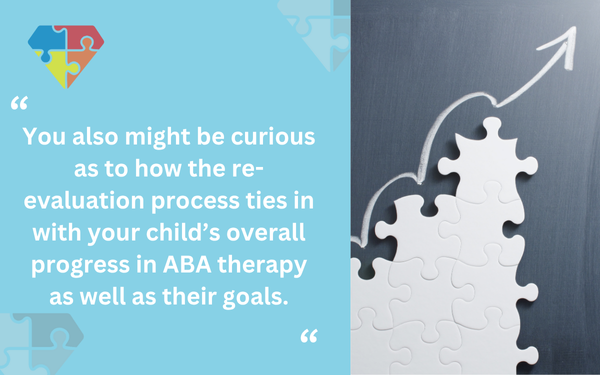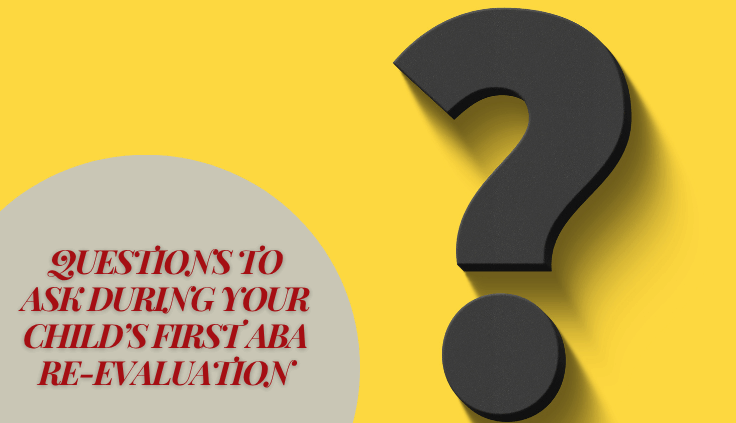Questions to Ask During Your Child’s First ABA Re-Evaluation
Applied behavior analysis, or ABA therapy, is considered the gold standard treatment option for children with autism spectrum disorder (ASD). As a science- and evidence-based approach to learning and behavior, it relies heavily on data to inform its strategies.
ABA therapy treatment programs are personalized to each individual patient, and this is done through an initial evaluation and assessment that analyzes where each child is and what their unique strengths, challenges and needs are.
During sessions, therapists collect data that can be analyzed later to track the progress the child is making toward their goals. This information can then be used to determine whether strategies and/or goals need to be adjusted.
During the ABA therapy process, your child will go through a re-evaluation. This is meant to take a step back and evaluate where your child is currently compared to where they were when the initial evaluation was completed.
Below, we outline some questions to ask during your child’s first ABA re-evaluation, broken down by category.
| Key Takeaways |
|---|
| ABA therapy is data-driven and personalized for each child with ASD. |
| Re-evaluations are essential to adjust goals based on progress and needs. |
| Parental involvement is critical to reinforcing skills and ensuring generalization. |
| Asking the right questions during re-evaluations improves collaboration and outcomes. |
Table Of Contents
The Process
It’s important to first understand how the re-evaluation process in ABA therapy works. You’ll want to know the details of the re-evaluation and how it differs from the initial evaluation process.
Some important questions you might want to ask include:
- How often will my child get a re-evaluation?
- What does the process entail?
- Why is it necessary for my child to have a re-evaluation for ABA therapy?
- Will the same people who conducted their initial evaluation also do the re-evaluation?
- What is my role in the re-evaluation process?
| ✅ Re-Evaluation Category | Questions for Parents to Ask |
|---|---|
| 🔍 Process | ☐ How often is re-evaluation done? ☐ What does it include? ☐ Why is it necessary? ☐ Will the same team handle it? ☐ What’s my role? |
| 📊 Progress Tracking | ☐ How is progress measured? ☐ What metrics are used? ☐ Are goals reviewed with new data? ☐ Will I get reports or team meetings? |
| 🎯 Treatment Adjustments | ☐ Will therapy goals change? ☐ Will therapists change with new goals? ☐ Is my child ready for these goals? ☐ What should I adjust at home? ☐ Will the therapy approach shift? |
| 🤝 Parent Involvement | ☐ How can I reinforce therapy strategies at home? ☐ How do I support skill generalization? ☐ What’s my long-term role in ABA therapy? |
Your Child’s Progress
You also might be curious as to how the re-evaluation process ties in with your child’s overall progress in ABA therapy as well as their goals.

Some important questions you might want to ask include:
- How will you be measuring my child’s progress in ABA therapy?
- What metrics will you be using to measure this progress, and how was the progress tracked during sessions?
- How often will my child’s ABA goals be re-evaluated? Are they adjusted every time that you have new information?
- How is it determined whether my child is making progress toward their goals?
- How will I be informed about this progress? Will I receive reports, have a meeting with the team or both?
The Treatment
Next, it’s important to understand how the re-evaluation process will factor into your child’s overall treatment. This will help inform you about how the data collected during the process will change your child’s treatment plan.
Some important questions you might want to ask include:
- How will my child’s ABA therapy goals change? What will the new goals look like, and are they appropriate for them?
- Will my child have the same therapists, or do their new goals mean they need new people on the team?
- Is my child ready for these new goals? And what data suggests that they are?
- What adjustments do I need to make, if any, to best help support my child and their new ABA therapy goals?
- Will there be a new and/or different approach to ABA therapy after this re-evaluation? When will the next re-evaluation take place?
The Importance of Being Involved
Parental involvement is one of the most important factors of long-term success in ABA therapy. Since children spend most of their time outside of therapy sessions with their parents, it helps immensely when the parents — and other family members — are able to reinforce the strategies learned in therapy outside of sessions.
By being involved in your child’s ABA therapy, it helps them solidify the new skills and behavior modifications they’re learning in therapy, which often leads to skill generalization over time. This means they’re able to take the skills they’re learning in ABA therapy and apply them to real-world scenarios.
That’s the ultimate goal of ABA therapy, as generalization leads to greater independence.
Blue Gems ABA Basis Treatment on Data
As a parent of a child with ASD, it’s important that you feel comfortable with your child’s ABA therapy plan. That starts with asking whatever questions you have during your child’s first ABA re-evaluation and all other aspects of their treatment.
At Blue Gems ABA, we base all of the ABA therapy treatment plans we create for our patients on data and evidence that we collect during initial evaluations, re-evaluations and therapy sessions. This helps us cater the plans to each individual child’s unique strengths, challenges and needs, which makes them more effective.
To learn more, please contact us today.
| Frequently Asked Questions (FAQ) |
|---|
| How often do re-evaluations happen? Usually every 6 months, but this may vary depending on the provider and child’s needs. |
| Who conducts the re-evaluation? Typically, a Board Certified Behavior Analyst (BCBA), sometimes in collaboration with the initial evaluation team. |
| What happens after the re-evaluation? Goals and treatment plans may be updated to reflect current abilities, challenges, and progress. |
| Do parents participate in the re-evaluation? Yes, parent input is often requested and encouraged for the most accurate and effective planning. |




